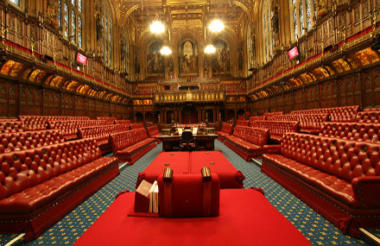Charity umbrella bodies have warned that the relationship between the sector and government has become strained, in submissions to the House of Lords Select Committee on Charities.
Sector bodies also said the sector needs more funding and legal reform. Some key requests are:
- Greater legal recognition for the role of trustees, and a fund for volunteering (NCVO)
- Strategic support for fundraising (Institute for Fundraising)
- Review of the charity tax system (Charity Tax Group and Charity Finance Group)
- A review of grantmaking (Directory of Social Change)
- Strengthening of the Social Value Act (SEUK)
A number of organisations highlighted the Lobbying Act and planned introduction of the anti-advocacy clause to government grant contracts, along with the shift from grant to contract funding had altered the relationship between charities and the government.
In its submission NCVO said: “Effective government engagement with the sector means more than just letting them bid for contracts. It means trusting the sector, and its trustees, to work in the way it does best and not restricting the space for charities and civil society to campaign.
“Yet, over the past couple of years, there have been a number of government initiatives that have either directly or indirectly limited charities’ ability to campaign, sending the message to trustees that their charity’s right to speak out is under threat.”
It added that “the government and the voluntary sector need to chart a new course in their relationship” in order to “ensure the sector is part of the solution as our country exits the European Union”.
Navca noted in its response that cuts to local authorities had led the decline in support could lead to “fewer emerging or new charities, meaning less variety, and a strain on quality”.
It also called for the Office for Civil Society to do more and come up with a “vision” for the voluntary sector.
“OCS needs to re-discover its purpose and be a champion for the sector across government rather than carp and criticise,” the umbrella body said.
More support
Charities have said that charities need more support in a number of areas.
NCVO called for a volunteering fund which will “help to ensure that we are developing an approach to volunteering that is fit for the future”.
It added that: “Charities will need to adapt their approaches to engaging and supporting volunteers taking into account: demographic change, changes in people’s lifestyles and how people want to volunteer and ways to embrace digital tools to help facilitate this change.”
The Charity Tax Group has called for a “dramatic review” of how the system of taxes and reliefs apply to charities “to identify duplication and over layering of regulations”.
The Institute of Fundraising suggested setting up a ‘how to fundraise hotline’ to “support smaller charities with advice on how to start fundraising” as well as more “investment in fundraising skills and development” with strategic, targeted interventions from government.
Social Enterprise UK has called for the government to “strengthen and extend the Public Service (Social Value) Act 2012”.
The Charity Finance Group said the government should “implement full-cost recovery and improve the tax environment for charities to free up additional resources”.
The Directory of Social change highlighted a north/south divide in grantmaking and suggested that the government do something.
It said: “Government could play a key role in coordinating this, perhaps through the Big Lottery Fund which could use resources to act as a convener.”
Charity Commission
A number of submissions also noted the cuts to the regulator’s budget.
CFG also said the “significant changes in fundraising regulation, financial regulation (for example, in setting reserves policies) and increased expectations in terms of governance from the Charity Commission” had “a particularly negative impact on small charities”.
It called for the Commission’s funding levels to be restored to the 2009/10 level so that it can provide more support.
The Wales Council for Voluntary Action suggested that the Charity Commission could carry out “advisory visits that are non-compulsory, voluntary assessments of compliance,” which would “help to increase public confidence”.
The Charities Aid Foundation warned that: “Over recent years the relationship between the Commission and charities has become increasingly adversarial, with concerns voiced about the regulator becoming politicised.
“The Commission must remember that a core part of its remit is to increase trust, and that enforcement and public scrutiny are just two of the tools available to achieve that. A more positive, supportive relationship between charities and the Commission would be to the long-term benefit of the sector.”
In its submission the Commission said: “More work must be done to support trustees; enabling them to meet the requirements of the law and the expectations of the public. This will also help to avoid the unintended consequence of deterring those who may be capable of being effective trustees from volunteering.
“As regulator we know we must balance strong compliance messages with a recognition of the importance of skilled, capable trustees to the health and sustainability of the sector, as well as the benefits of trusteeship for the individual.
It added: “Good trusteeship and governance, and accountability for the management of charity funds and assets, are therefore crucial to the effectiveness of charities and the sustainability of the sector going forward. We welcome the Committee’s scrutiny of current efforts to improve the quality of trusteeship, governance and accountability of charities and further recommendations, to the Commission and to others for improvement.”
Changing the role of trustees
Issues around charity governance has been highlighted by both the fundraising and Kids Company scandals last year, and the committee has asked for views on it.
NCVO’s submission said: “The way in which charities are governed has not been appropriately reviewed and updated to ensure different governance models are in place to respond to different needs.
“Too often, boards in the sector lack the skills that they need in this day and age and too often, they can struggle to meet good practice.”
It called for government to “amend the law to put trusteeship on a par with becoming a magistrate or school governor”.
“This would not only raise the profile of trusteeship, but it would in practice make it easier to access.
“By extending employees’ existing right to take reasonable time off for certain public duties (e.g. to serve as magistrates, councillors or on the governing bodies of schools) to being a trustee in the social sector, government would be taking an important step in helping improve the supply of individuals onto boards in the sector.”
WCVA also indicated that charity governance could be improved by looking at paying trustees, or forcing new trustees to take a training course.
“External support could be achieved through trustees’ networks and regular, or potentially mandatory, training on roles and responsibilities,” it said.
WCVA added that: “It could be argued that remunerating trustees could attract more trustees (quite often organisations struggle to recruit) and it may mean they are able to dedicate more time to their roles.”
Technology
The committee has specifically asked for feedback on how charities are using technology. A number of responses from charities admitted that this was an area where the sector is behind.
Charity sector think tank, New Philanthropy Capital, said: “Charities face a chronic lack of digital expertise and capacity.”
NPC is running a digital transformation programme.
“Funding is also a barrier, not least for hiring in skills and for the ongoing development of technology. If the sector is to harness the opportunities digital offers, investment is needed,” it said. “There is a strong role for government here to support this work, just as they have done in social investment, especially given how much greater the opportunities are in this area.”
The Foundation for Social Improvement told the committee that “small charities need to be supported in increasing their digital engagement through improving access and awareness of skills.
“Respondents believe the government should have a role in this. For instance, by bringing together voluntary organisations with private sector organisations to share learning and also to encourage companies to provide pro-bono support to the smaller charities.”
Related articles












